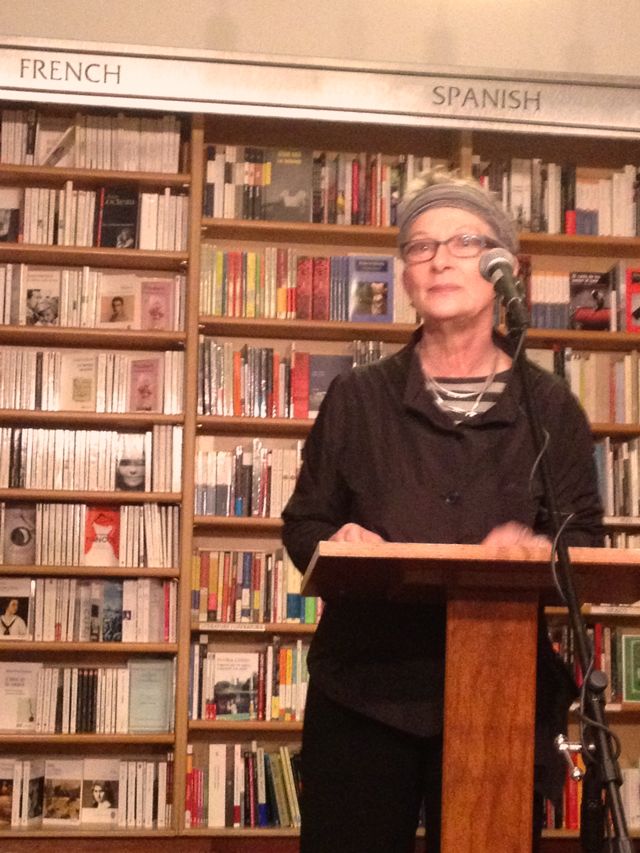
The Poetry Society of America brought together poets Ana Božičević and Ann Lauterbach for a reading at McNally Jackson Books. The reading was the third in a series organized by the Poetry Society of America. Previous readers from the series included Angelo Nikolopoulos paired with C. K. Williams and Nick Laird paired with Meghan O’Rourke.
Ana Božičević read from her latest collection, Rise in the Fall, published by Birds. Božičević and her little dog Klaus took to the stage to read, Klaus secure in her purse. She explained that she snuck the dog in, and that it was his first poetry reading. Klaus was well behaved.
Božičević read the first poem from Rise in the Fall , “About Nietzsche,” a narrative beginning with Nietzsche landing on earth and conversing with a horse. The poem shifts with the speaker apologizing for writing “the whitest shit / I’ve ever written,” her excuse that Osama bin Laden had been killed.
Božičević was born in Crotia emigrating to the United States at the age of nineteen, and so she reads with a slight accent. But it is the emergence of this cadence that empowers her readings with a levity and humor that might otherwise be missed.
She then reads “Paris Pride Parade,” confessing that the mention in the poem of Paris’s Arc de Triomphe was actually inspired by the triumphal arch in Brooklyn’s Grand Army Plaza. She was too poor to go to Paris, she says. But there is a puppet theater in the Grand Army Plaza arch, she adds, by way of consolation. “Paris Pride Parade” begins with a bit of humor, particularly imputed with the inflection Božičević reads: “I’m sobering up from too much almond / liqueur.” But the poem takes a darker turn as the speaker comes to love death.
Interspersed through the collection are several illustrations. Some are crude nudes, while others include dialogue. Put together, the book is a handsome piece.
She moves onto “War on a Lunchbreak,” a poem she says she wrote hastily during a lunch break. There is hostility in the pieces, she warns everyone saying it might sound like an “angry Lesbian Frank O’Hara.” Her frustration is evident though. She confronts issues of gender: “Lady Poets writing about cock, / not thinking about gender. My Friends married in Vegas.” In addition, she stakes herself to an anti-corporate position, frustrated that her day is demarcated by a business schedule rather than an artistic one, taking issue with people who “act offended when one leaves work / on time.” The conflict is within her limitations as a creator, lamenting, “I’d like to have time to type this, / but all day long they’re looking over my shoulder. / I do.” Ultimately, it seems her concerns remain unresolved.
Božičević gives the audience a choice: a poem about Liz Taylor or one that is a combination of elegy and bildungsroman. The audience asks for the elegy and she reads “Casual Elegy for Luka Skračić,” a poem about the death of her friend.
Ann Lauterbach steps up to the microphone when Božičević finishes. First she reads two poems that are set to appear in The American Reader (edited by Ben Lerner). She then reads from her new collection, Under the Sign.
She begins with “Translator’s Dilemma,” though she says the exact dilemma evades her now, she suggests imaging a writer, her, at a desk translating. As she reads, she keeps the beat with her hand.
The collection is broken into three sections. Lauterbach explains that she thinks this makes makes it difficult to read from, particularly as the middle section tends toward more prosaic forms. She starts reading a poem about Lou Reid. She calls it an inadvertent elegy. But she stops reading it, instead flipping the page to another poem, “Basement Tape.” She never had performed “Basement Tape.”
Lauterbach says she grew up in New York, and though she now moves away, the middle section of the book opens with a nostalgic look back on her return. It seems the strongest of what she has read, a reflection on the changes in the city, or the ability to be spontaneous, a kind of lamenting of her departure. She then reads briefly from the final section of the book.